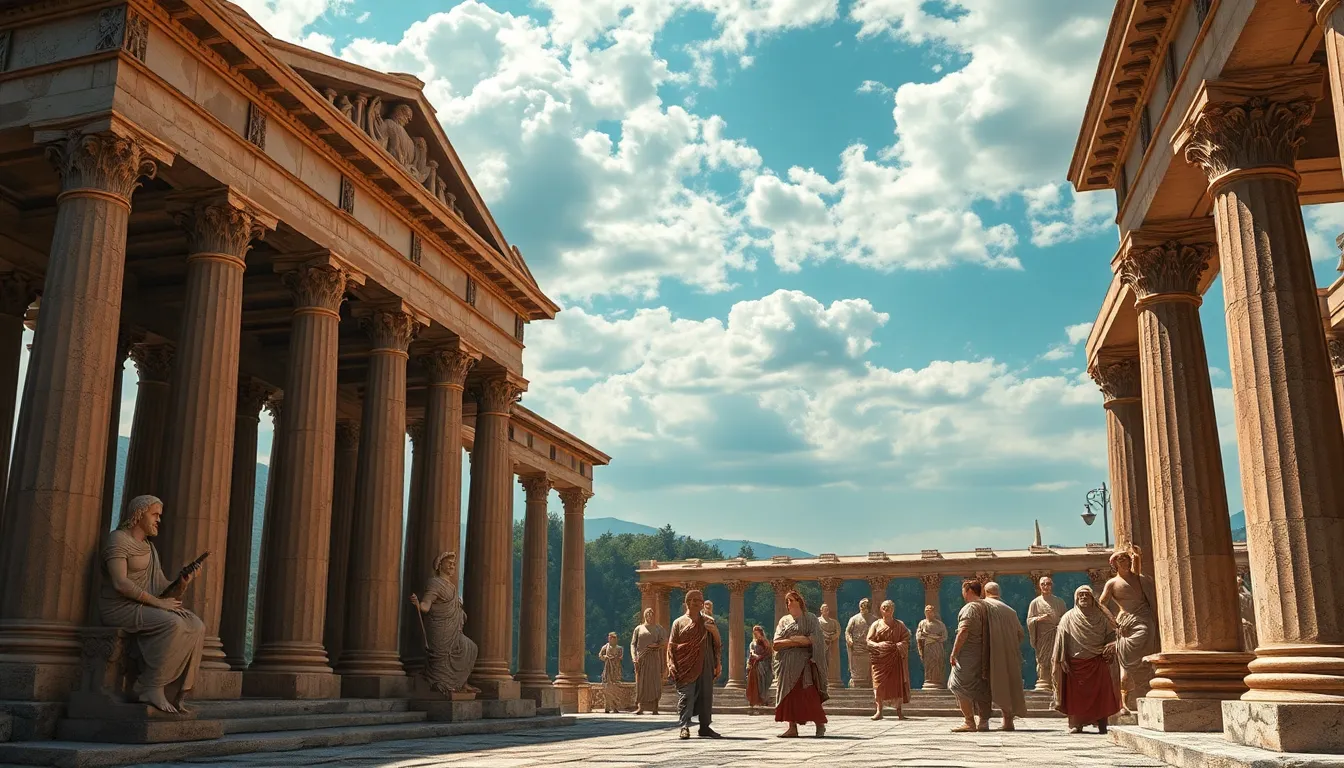The Role of the Gods in Shaping Greek Festivals: Divine Inspiration
I. Introduction
Greek festivals were not merely occasions for celebration; they were vibrant expressions of the cultural, religious, and social life of ancient Greece. These festivals played a crucial role in the civic identity of the city-states, serving as a means of honoring the gods while fostering community spirit.
The influence of the gods permeated every aspect of life in ancient Greece, with festivals often dedicated to specific deities that shaped the agricultural calendar, communal life, and artistic expression. This article explores how divine inspiration underpinned the festivals of ancient Greece, providing insight into their cultural significance and enduring legacy.
II. Historical Context of Greek Festivals
The origins of Greek festivals can be traced back to the ancient agrarian society, where seasonal changes were celebrated through rituals and communal gatherings. Over time, these festivals evolved, becoming more structured and intricately linked to the pantheon of gods.
Major annual festivals, such as the Panathenaea in Athens and the Dionysia, showcased the deep connection between religion and public life. These events often featured competitions, processions, and sacrifices, reflecting the importance of these celebrations in maintaining social order and religious devotion.
III. The Pantheon of Greek Gods and Their Associations with Festivals
At the heart of Greek festivals was the pantheon of gods, each associated with various aspects of life and nature. Some key deities included:
- Zeus: King of the gods, ruler of Mount Olympus, and god of thunder.
- Athena: Goddess of wisdom, war, and crafts.
- Dionysus: God of wine, fertility, and theater.
Specific festivals dedicated to these gods included:
1. Dionysia and Dionysus
The Dionysia was perhaps the most significant festival dedicated to Dionysus, celebrated in Athens with dramatic performances, processions, and the presentation of new plays.
2. Panathenaea and Athena
The Panathenaea honored Athena, featuring a grand procession, athletic competitions, and a sacrificial offering of a new peplos (robe) for the goddess.
3. Olympic Games and Zeus
The Olympic Games, held every four years in Olympia, were dedicated to Zeus and included athletic competitions that brought together city-states in a spirit of unity and rivalry.
IV. Rituals and Practices: Invoking Divine Favor
Rituals performed during festivals varied widely but were essential in invoking divine favor. Common practices included:
- Processions to temples and sacred sites.
- Ritual dances and music.
- Public feasts and communal gatherings.
Sacrifices and offerings were central to these rituals, with animals such as goats and sheep often sacrificed to please the gods. The role of priests and priestesses was crucial, as they led the ceremonies and ensured that the rituals were performed correctly to gain the gods’ favor.
V. The Impact of Mythology on Festival Themes
Mythology played a vital role in inspiring festival celebrations. Many festivals were rooted in specific myths that were recounted during the events.
- Myths of creation and the gods’ adventures provided narratives for the festivals.
- Storytelling and performances, including tragedy and comedy, were performed to honor the gods and explore human nature.
- Theater and arts flourished during these festivals, reflecting the cultural values and beliefs of the time.
VI. Community and Social Cohesion Through Divine Celebration
Festivals served as a unifying force within city-states, bringing together citizens from different social classes and backgrounds. Shared rituals fostered a sense of community and identity, allowing individuals to participate in the collective celebration of their gods.
Inclusivity was often a hallmark of these celebrations, with various social classes participating in different capacities, from the wealthy sponsoring events to the common people joining in the festivities. This shared experience played a crucial role in reinforcing social bonds and civic pride.
VII. The Evolution of Greek Festivals in the Hellenistic Period
With the conquests of Alexander the Great and the subsequent Hellenistic period, Greek festivals began to evolve. New influences emerged as Greek culture mingled with those of other conquered peoples.
Changes in festival practices included:
- Incorporation of foreign deities and rituals.
- Expansion of festivals to include more athletic and artistic competitions.
- Continuation of divine themes, although often blended with local customs.
VIII. Conclusion
The gods of ancient Greece played an instrumental role in shaping the festivals that defined the cultural landscape of the time. These celebrations were not only expressions of religious devotion but also reflections of community identity and social cohesion.
The lasting legacy of these divine influences can be seen in modern celebrations that echo the themes of joy, unity, and reverence. Understanding the importance of mythology in these ancient festivals provides us with a deeper appreciation of the cultural heritage that has shaped societies through the ages.




